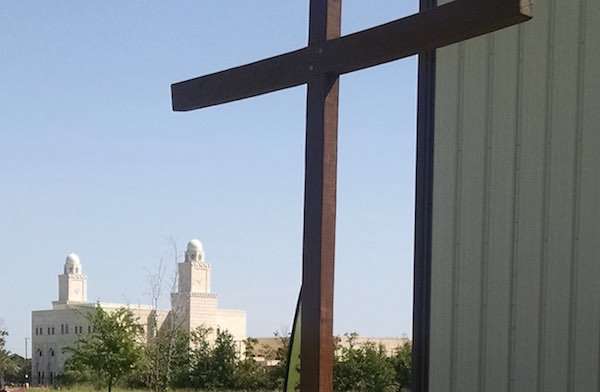Michigan Mosque Takes in a Homeless Unitarian Church
When construction delays on their new building threatened Sunday services for a church in Michigan, a local Muslim house of worship came to the rescue.

Every day for five years, youth pastor Rich Reaves has arrived to work in the shadow of a cross and a crescent moon. There, at his Houston church, he and senior pastor Elliott Scott discuss ways they can live out "true Christianity" by loving their neighbors–in this case, members of a mosque next door.
Meanwhile, across town, a dozen religious leaders from the Islamic and Christian communities meet to find common ground and discuss ways to educate Houstonians on "true Islam," in order to address growing concerns over Islamophobia.
While recent news reports focus on the ISIS threat, and verbal attacks made by Christians against Muslims, a less reported story is going on behind the scenes: members of the two faiths coming together in the name of peace.
"I couldn't figure out how to reach them," Reaves said, noting that there was no signage around the mosque's gated complex to even indicate what the name of the mosque was. "I finally called the phone number posted for deliveries."
He learned that the mosque was planning an event that would bring thousands of Muslim visitors to the neighborhood. Rather than recoil, Reaves took the opportunity to offer help. The church offered its soccer field and parking lot to make room for the visitors–and teams of youth passed out bottled water to those heading toward the mosque. Although Lifepath is an evangelical church, they made no attempts to proselytize. They focused on simple acts of service and words of kindness–and were given gratitude in return.
The path to interfaith cooperation has been cobbled together in a different way on the other side of Houston by Bishop James Dixon II and M.J. Kahn.
When Dixon, the pastor of a large African American church called the Community of Faith, put together a citywide faith-based relief effort for Tax Day Flood victims in April, he decided to invite Islamic leaders to participate alongside area pastors. Out of this response to tragedy grew a discussion on how to build a bridge of understanding between Christians and Muslims to combat Islamophobia.
Dixon said that as an African American, he could relate to being the target of prejudice, and so he felt compelled to stand with moderate Muslims who have become recent targets of vilification. Recognizing that the root of prejudice is often ignorance, he and Khan, president of the Islamic Society of Greater Houston, are now working together on a summit to educate the public about Islam.
"There are a lot of misconceptions about Islam," Kahn said. "Most people aren't afraid of Islam itself. They are afraid of the unknown."
Their hope is that with greater love and greater understanding, there will be a greater chance for peace.
WHY Not Do This In Your Community: Share This!
Be the first to comment